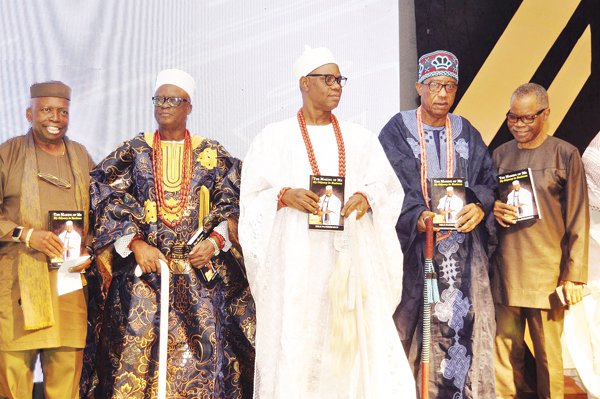
A memoir by Chief Oladele Fajemirokun, a first-rate entrepreneur, reveals how he made his fortune, and lays to rest the widely-held belief that he is an inheritor. FEMI MACAULAY, a member of the Editorial Board, reviews the autobiography.
How can the son of a prosperous man claim to be self-made? Chief Oladele Fajemirokun, 69, provides an answer to the paradoxical poser in his memoir, unveiled at the Civic Centre, Victoria Island, Lagos. It is easy to jump to the conclusion that the memoirist inherited the wealth of his father, Chief Henry Fajemirokun, who died in 1978 at 51, and was a reference point for prosperity in his lifetime. But the junior Fajemirokun’s story about how he became prosperous is clarifying. Indeed, the autobiography, titled: The Making of Me – My Odyssey in Business, is a portrait of a self-made man.
Interestingly, the senior Fajemirokun was a self-made man too. His son’s memoir is, therefore, the story of a self-made man whose father was also self-made. The memoirist was born in Lagos, “in a rented, one-room apartment of a tenement building, at No. 6 Eletu-Iwase Street, in Isale Eko.”
According to the autobiographer, “Here was an area without water, except for the public tap; no toilets, except the pit and bucket latrine, which was emptied at night by ‘night soil men’ or agbepo; a most demeaning occupation and an unhealthy system of human waste disposal. This system was brought to an end by the administration of Governor Lateef Jakande in 1979 when he decreed the abolition of pit and bucket latrines throughout the city of Lagos.” He was born “on the bare floor (because there was no one to take my mother to the hospital for my delivery).”
But Chief Henry Fajemirokun later became rich. He was a high-flying entrepreneur who established his business wizardry through his running of the Henry Stephens Group of Companies. He was president of the Lagos Chamber of Commerce from 1971 to 1975, and also president of the West African Chamber of Commerce from 1972 until he died in his hotel room “while on chamber duty as head of a trade mission to Ivory Coast” in 1978. He was vice-president of the Commonwealth Chamber of Commerce and president of the Nigerian Association of Chambers of Commerce, Industry, Mines and Agriculture (NACCIMA).
“At the peak of his success in business,” says his son, “he bought a Rolls-Royce Phantom and a Mercedes Benz 450S as his official cars. If he had lived longer, I guess he probably would have been the first Nigerian to own a private jet.”
However, the memoirist says: “… until my father died, 27 years into my earthly life, I never tasted the silver spoon nor the special privileges associated with children of a wealthy father.”
“I never travelled abroad, never went on summer holidays nor attended elite schools … Most holidays, I was sweeping the floor in my father’s warehouse or working as a tally clerk in his clearing and forwarding company, and later, during secondary school and as a university undergraduate, as a clerk in the bank. My dad never believed in giving me pocket money. It was a concept that was alien to him, but only as far as it concerned me. He believed that I had to earn my keep. He made me open a passbook account, which he kept, and occasionally made me withdraw money for my siblings. This action of my father created the working hunger for money and survival all my life.”
Following his father’s sudden death, the memoirist became Group Executive Director (GED) of the Henry Stephens Group. He said: “There was no money or liquidity, apart from bank facilities granted to him and his companies. The Fajemirokun ship was sitting on dry dock … In 1988, all the debts owed to the banks were fully repaid. However, the companies by this time had suffered untold hardship and pain. Many went under and the ones that remained were mere shells.”
Fajemirokun said he “never used any of the documents to secure facilities from any bank.”
The autobiographer admits that he benefited from his father’s “image and influence in society, including his very wide business and social network.” But, he says: “The story ends there.” He didn’t inherit riches.
He asserts: “I have earned everything I own in life. My houses in prestigious locations in Nigeria, the UK, the USA and South Africa were all built or bought by me from my own labours. They were not inherited; neither were they in anyway proceeds from my late father’s estate.”
How did the memoirist become so rich? A year and four months after his father’s death, “one sunny Wednesday afternoon, in June 1979,” three Americans visited him in his office while he was GED of the Group. “It would be the turning point in my life,” he says. “The opportunity transformed me from a young man struggling to wrest my late father’s empire from the jaws of predators waiting in the wings, into a rich young man with lots of money to play with.”
His transformation was magical. Hear the memoirist: “They owned a telecommunications company – T-CAS Inc. (Telecommunications Consultancy and Services) – that had been engaged in some contracts with the Nigerian Ministry of Communications and its parastatal, Nigeria External Telecommunications (NET). They told me that they urgently needed a bridging loan of N50, 000. They had their money, running into millions of naira and dollars, tied up with NET and the ministry.
I knew that this was my chance… Without thinking of where and how I would raise the money, I looked at them and told them that I would give them the money with some conditions. Desperate men would do desperate things. They agreed.
‘’I told them the N50, 000 would represent my 51 per cent equity in their company and that I would be made Executive Chairman, to which they also agreed. I told them that we would also need to sign a Memorandum of Understanding (MoU). And they agreed. They were being owed millions of dollars and naira by NET and I knew that this was a big break that was coming to me.
‘’I now had to source the money. I went to Barclays Bank (now Union Bank Nigeria Plc) head office branch, Marina, Lagos, where I had my personal account… The manager was agreeable to my proposal for a facility of N50, 000. I took along the title of my undeveloped plot on Toyin Close through Opebi, Ikeja (which would later become Allen Avenue), which I intended to use as collateral … I did not have any other means of collateralisation because I owned no house or stock in any blue-chip company. But, behold, two weeks later, the account was boasting $11m! …I latched on to the hook line of T-CAS and became a ‘made’ man. Suddenly, I became rich beyond my wildest dreams and imagination and I was just 29 years old.”
Fajemirokun’s entrepreneurial energy has taken him beyond his big breakthrough. He is a major player in key sectors of the economy, including insurance, telecommunications, oil & gas, agriculture, supply food chain and manufacturing. He has nurtured and invested in “best-in-class companies,” notably, American International Insurance Company (AIICO Plc.), Food Concepts & Entertainment Plc. (Owners of Chicken Republic), Xerox Nigeria, now XHS, Johnson Wax (A Johnsons & Johnsons company, makers of Baygon & Raid Insecticides), Kings Guards Securities Group Limited, which has more than 25,000 employees across the country, Logic Science Limited, FSS Gases Limited and Bluechip Communication Limited. While writing the book, he was serving as Chairman or Director on the Board of “43 companies overall.”
A first degree in Business Economics from the University of Ife equipped him for his “odyssey in business.” “It was to Ife that I resumed in the summer of 1971. It was to be a momentous four years, because I had to repeat a class as a result of my behaviour and lackadaisical attitude to my studies,” he writes, adding: “In the course of my business life, I have had recourse to drawing on the education I received at Ife.”
About five years ago, his “oldest childhood friend and confidant,” Tunde Jose, had prompted him to tell his own story in his own words. Other friends, associates and business partners also encouraged him to “put some of the ideas I have into writing because they say that many of my takes on business are not taught at the ‘Harvard Business School’ and that they would be of immense benefit to younger people who choose to go into my line of business, which is venture capital and ‘angel’ investment.”
The memoir unveils the memoirist: His roots, his “positive deviance,” his early struggles, his friends and foes, his successes and failures, his strengths and weaknesses, his business and social involvements, his interactions with people in power, his family life and philosophy of life. With arresting forthrightness, Fajemirokun presents his life story as a testimony to the power of possibilities.
Beyond characterising the author, the autobiography also has the character of a business textbook. It offers case studies of businesses that benefited from the memoirist’s Midas touch. It can be described as the businessman’s companion, a useful reference book for business success.
The memoir’s quality of believability helps the memoirist to achieve his main objective of clarifying how he made money. Ultimately, Fajemirokun succeeds in illuminating the narrative of his prosperity.
You may be interested

Done Deal: Falconets Forward Joins American Club Carolina Ascent
Webby - November 16, 2024Former Falconets forward Opeyemi Ajakaye has joined USL Super League club, Carolina Ascent FC on loan.Ajakaye linked up with Carolina…

Orban’s Lyon Face Provisional Relegation To Ligue 2 Amid Financial Woes
Webby - November 15, 2024Olympique Lyon the club of Nigerian striker Gift Orban, have been handed a provisional Ligue 1 relegation by theDNCG who…

Ghana Miss Out On AFCON 2025 Qualification After Draw With Angola
Webby - November 15, 2024Black Stars of Ghana’s hopes of qualifying for next year’s AFCON was ended after they played a 1-1 draw away…

















![American Pastor, David Wilson Seen Eating The Box Of Woman Who Isn’t His Wife [Video]](https://onlinenigeria.com/wp-content/uploads/2019/10/american-pastor-david-wilson-seen-eating-the-box-of-woman-who-isnt-his-wife-video-150x150.jpg)








![[Coronavirus] Atiku to Buhari: Stop all flights from affected countries](https://onlinenigeria.com/wp-content/uploads/2020/02/coronavirus-atiku-to-buhari-stop-all-flights-from-affected-countries.png)
